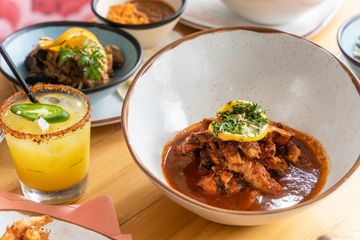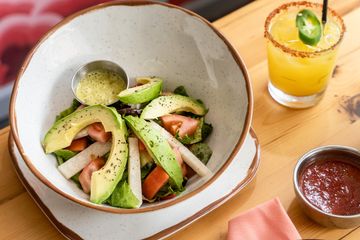Is Mexican Food Healthy? Unpacking the Nutritional Perks of Typical Active Ingredients
The question of whether Mexican food is healthy and balanced invites an expedition of its conventional ingredients. Beans and corn function as foundational staples, abundant in healthy protein and fiber. Avocados supply useful fats, while numerous natural herbs and spices include flavor and health advantages - New York Times rated. With each other, these components develop a tapestry of nutrition. The healthiness of Mexican cuisine commonly depends on preparation approaches and section dimensions. What function do these variables play in identifying its overall dietary value?
The Power of Beans: Healthy Protein and Fiber-Rich Staples
Often overlooked, beans serve as a foundation of Mexican cuisine, providing a wide range of nutritional advantages. Rich in healthy protein, they are an outstanding plant-based choice for those looking for to fulfill their nutritional healthy protein requires. This high protein material sustains muscular tissue repair service and development, making beans vital for both meat-eaters and vegetarians alike. Additionally, beans are an extraordinary source of dietary fiber, which helps in digestion and advertises a feeling of volume, possibly aiding with weight administration.
The range of beans utilized in Mexican recipes, such as black beans, pinto beans, and kidney beans, contributes to a diverse taste profile and can enhance meals nutritionally. Additionally, beans are reduced in fat and consist of vital vitamins and minerals, including folate, iron, and magnesium. Together, these attributes make beans a crucial component, delivering both sustenance and nutrition in conventional Mexican fare.
Corn: a Versatile Grain With Nutritional Benefits
Corn stands out as a flexible grain essential to Mexican food, celebrated not only for its cooking applications but also for its excellent dietary account. As a primary active ingredient in meals like tortillas, tamales, and pozole, corn offers necessary nutrients that add to a well balanced diet. Rich in carbohydrates, it serves as a substantial power resource, while also being low in fat, making it a positive option for different dietary requirements.
Corn is a good resource of dietary fiber, which aids in digestion and advertises satiation. It includes considerable amounts of vitamins such as B-complex vitamins, which are vital for basal metabolism. The visibility of antioxidants, particularly carotenoids, contributes to overall wellness by lowering oxidative anxiety. Additionally, corn is gluten-free, accommodating those with gluten level of sensitivities. Generally, the nutritional benefits of corn underscore its significance in typical Mexican food and its function in a healthy and balanced diet.
Avocados: Healthy Fats and Nutrients in Every Bite
Avocados play a substantial role in Mexican food, complementing dishes with their velvety structure and rich taste. Past their cooking allure, avocados are celebrated for their impressive nutritional profile. They are a rich resource of healthy monounsaturated fats, which can help reduced poor cholesterol degrees and support heart health. Additionally, avocados are loaded with vital nutrients, including potassium, vitamin E, and B vitamins, adding to overall health.
The high fiber web content in avocados aids digestion and advertises satiation, making them an advantageous enhancement to any meal. Their one-of-a-kind nutrient structure can also sustain skin health and wellness and give anti-inflammatory advantages. Integrating avocados right into traditional Mexican dishes or appreciating them as a standalone treat can enhance both flavor and nutrition, showing why they are a beloved staple in Mexican food. On the whole, avocados use a tasty method to delight in healthy fats and vital nutrients in every bite.

Flavors and Natural Herbs: Flavorful Wellness Boosters
While taking pleasure in the rich flavors of Mexican food, one can not overlook the crucial function that spices and natural herbs play in improving both taste and wellness. Ingredients such as chili, cilantro, and oregano peppers not just contribute to the vibrant flavor account yet additionally supply substantial health and wellness advantages. For circumstances, cilantro is recognized for its detoxifying homes, aiding to remove heavy steels from the body, while oregano is loaded with anti-oxidants and has anti-inflammatory effects.
Chili peppers, a staple in many Mexican dishes, consist of capsaicin, which has actually been linked to enhanced metabolism and pain relief. Additionally, flavors like cumin and coriander support food digestion and might help in blood glucose law. Integrating these savory health boosters right into dishes not only improves the cooking puerto rican food near me experience but likewise advertises total well-being, making Mexican cuisine not simply scrumptious, yet likewise nutritionally advantageous.
Traditional Food Preparation Techniques: Enhancing Nourishment and Taste
Typical food preparation techniques in Mexican food play an important duty in boosting both nutrition and flavor, as they frequently focus on time-honored techniques and fresh active ingredients. Techniques such as nixtamalization, where corn is soaked and prepared in an alkaline service, not just improve the nutrient account of tortillas however also improve their digestibility - happy hour. In addition, using slow-moving food preparation methods, like stewing or braising, allows tastes to More Help blend beautifully while keeping the integrity of the components

Frequently Asked Questions
Are Mexican Food Portions Generally Larger Than Various Other Cuisines?
Mexican food portions are frequently larger than those of numerous various other foods. This particular shows typical dining practices, highlighting common sharing and hearty dishes, which can result in an extra substantial serving size in general.
Just how Does the Preparation Technique Affect Healthiness of Mexican Food?
Prep work techniques considerably influence the healthfulness of Mexican food. Strategies such as cooking or steaming protect nutrients, while frying can increase unhealthy fat web content. Selections of components and cooking styles inevitably establish total dietary value.
Can Mexican Food Be Customized for Particular Dietary Limitations?
Mexican food can certainly be tailored for details nutritional constraints. Substitutions, such as using corn tortillas for gluten-free diet regimens or including more veggies, make it possible for people to enjoy typical flavors while suiting different nutritional needs.
What Prevail Misconceptions About Mexican Food and Health?
Usual misunderstandings about Mexican food consist of the belief that it is naturally unhealthy, overly hot, and exclusively concentrated on fats. In truth, traditional meals typically include nutritious components and can be tailored to numerous nutritional requirements.
Exist Much Healthier Alternatives at Mexican Dining Establishments?
Much healthier choices at Mexican restaurants typically consist of grilled meats, beans, and fresh veggies. Picking meals that highlight whole components and preventing hefty sauces can result in a more nourishing eating experience, advertising general well-being.
The range of beans utilized in Mexican meals, such as black beans, pinto beans, and kidney try these out beans, contributes to a varied flavor profile and can enhance meals nutritionally. Avocados play a substantial role in Mexican cuisine, complementing meals with their creamy structure and rich taste. Including avocados right into traditional Mexican dishes or enjoying them as a standalone snack can boost both flavor and nutrition, demonstrating why they are a cherished staple in Mexican cuisine. While enjoying the abundant tastes of Mexican cuisine, one can not overlook the essential function that spices and herbs play in improving both taste and wellness. Traditional cooking techniques in Mexican cuisine play a crucial function in enhancing both nourishment and taste, as they frequently prioritize classic methods and fresh ingredients.